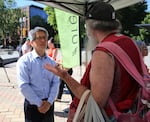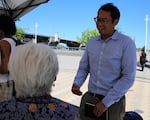
Attorney John Kodachi, former president of the Portland Japanese American Citizens League, thinks the Oregon's bias crime law could be changed so that people who are charged with first-degree hate crimes, are not released before their case is heard.
Kristian Foden-Vencil / OPB
People gathered Thursday in Portland to call for a focused response to an increase in hate crimes perpetrated against Asian Americans.
Earlier this month, a Portland man punched a father and his 5-year-old daughter while they were riding bikes in what police say was a racially-motivated attack. Then last week, another man allegedly made a series of racist, anti-Asian remarks to a driver during a road rage incident.
“I know people who are afraid to go out at night,” said Chisao Hata, the creative director of the Japanese American Museum of Oregon.
“They’ve changed their whole pattern of operating ... . They don’t walk alone,” Hata said.
Hata and others at Thursday’s rally are upset that Dylan J. Kesterson, the man accused of punching the father and daughter, was immediately released after being booked in Multnomah County jail on a first-degree bias crime.
The rally was organized by Oregon Rises Above Hate, a coalition of civil rights and community groups based in Oregon and Southwest Washington.
Rally-goers called for people arrested on hate crimes to be held in jail longer because of the danger they potentially pose to the community.
“What is the process that we can ensure that if somebody is caught and arrested, that they are held and not let out?” Hata asked.
Attorney John Kodachi, former president of the Portland Japanese American Citizens League, said he thinks Oregon’s bias crime law could be changed so that people who are charged with first-degree bias crimes are not released before their case is heard by a judge.
“I would certainly like to see certain crimes, like hate crimes, listed as non-releasable offenses,” Kodachi said.
Attendees also said Oregon needs more resources to ensure bias crimes are better documented.
Metro Councilor Duncan Hwang spoke on behalf of the Asian Pacific American Network of Oregon and estimated that more than 80% of bias crimes go unreported.
The Oregon Legislature allocated an additional $2 million in 2020 to boost data collection on such crimes.
“But we’d like to see them expand that and hire more staff that can work in language,” Hwang said.
He thinks people who want to report a hate crime are often frustrated by the language barrier.

Metro Councilor Duncan Hwang attended a rally against hate crimes on Thursday, July 14, 2022 in downtown Portland. He estimates that more than 80% of bias crimes go unreported.
Kristian Foden-Vencil / OPB
Groups representing Native Americans, Pacific Islanders, other people of color and LGBTQ+ individuals, attended the rally in support of the anti-hate effort.
Calls reporting incidents of hate crimes in Oregon increased dramatically in 2021, according to a U.S. Department of Justice study.
The study, released this month, found 1,683 reports of racially motivated crimes to the DOJ’s bias hotline. That’s a 53% increase compared to 2020, when there were 1,101 reports.
Asian and Black populations were the most impacted, according to the DOJ. Black Oregonians were victims in 34% of hate crimes and Asians in 12%, although hate crimes toward Asian and Pacific Islander Oregonians rose 200% in the past year.
Multnomah County had the most reports of bias crimes with 489. Clackamas County was second with 247, and Marion County was third with 148.
While the increase in reports of hate crimes is substantial, the Justice Department said its study was certainly an undercount, as hate crimes often go underreported. The DOJ urged Oregon to “collect and analyze quantitative data” to better understand the problem.
The Oregon Legislature changed the state’s hate crimes laws in 2019. It established a statewide Bias Response Hotline within the state Department of Justice at 1-844-924-2427.
Commenting on the DOJ report, Oregon Attorney General Ellen Rosenblum released a statement saying, “I am very pleased we have been able to step up our civil rights outreach over these past two years including adding hotline advocates and expanding the reach, accessibility and language availability of our Hate and Bias Hotline.”
She said that while the numbers seem discouraging, “they also remind us of the importance of continuing our work supporting victims and survivors of hate and bias.”
Anyone who is a victim of a hate crime, or witnesses, can use the hotline to talk to trained staff, receive a referral to law enforcement, or be put in touch with a social service agency.

Chisao Hata, the creative director of the Japanese American Museum of Oregon spoke at a rally against hate crimes on Thursday, July 14, 2022 in Portland. “I know people who are afraid to go out at night,” Hata said. “They’ve changed their whole pattern of operating.”
Kristian Foden-Vencil / OPB
